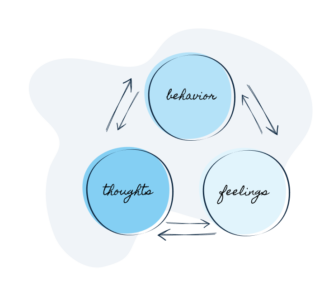5 Benefits of Cognitive Behavioral Therapy (CBT)

What is Cognitive Behavioral Therapy?
Cognitive Behavioral Therapy (CBT) is a structured and goal-oriented form of psychotherapy that was developed in the 1960s by Dr. Aaron Beck. It involves identifying and reframing patterns of negative thoughts, beliefs and behaviors. Dr. Beck believed that our thoughts and interpretations of events can contribute to mental health disorders including depression and anxiety. Related forms of therapy include Cognitive Therapy, Dialectical Behavioral Therapy (DBT), and Rational Emotive Behavior Therapy (REBT).
Overall, CBT focuses on identifying problematic thought patterns that contribute to emotional distress or unhelpful behavior. The therapist works collaboratively with the individual to encourage a more balanced outlook. CBT also incorporates learning specific skills and strategies to develop adaptive coping mechanisms.
CBT uses this model to encapsulate how our thoughts, feelings, and behavior are all interconnected:

Five benefits of Cognitive Behavioral Therapy
1. Reduced anxiety
Because our thoughts and reactions to situations can create or contribute to anxiety, CBT works by helping the individual learn to identify, challenge, and replace negative thoughts and beliefs that tend to exacerbate anxiety and reframe them into a more balanced and rational perspective. In CBT, this strategy is called “cognitive restructuring.” In some cases, exposure therapy may be utilized to address an individual’s fear and anxiety surrounding specific situations or objects. The CBT therapist works collaboratively with the individual to identify the right combination of interventions and strategies depending on their specific situation.
For example, in addition to practicing cognitive restructuring and/or exposure, the therapist may teach the individual specific skills such as relaxation and breathing techniques. In turn, the individual is given a set of tools they can use to effectively address their anxiety symptoms so they can begin to engage in situations they may have previously avoided and experience relief from tension.
2. Improved mood
When we’re in a negative mood state, we might be prone to thinking and acting in ways that are ultimately not helpful. CBT teaches us how to distinguish between thoughts, emotions, and behaviors. That is, our thoughts inform our emotions, which in turn influence our behaviors. By examining the root of your emotions, which are often influenced by negative thoughts and beliefs, you learn to challenge your negative thoughts before they spiral. In short, learning to be more mindful of your reactions to the things that happen throughout your day has the power to stabilize your mood, as you can sooner begin to identify when you are feeling overwhelmed or upset and implement more effective coping skills.
3. Higher self-esteem
Often, our self esteem is impacted by distorted thinking, something that may hold us back from participating in social events or taking advantage of new opportunities. CBT gives us tools for working through these biased assessments of ourselves so we are more likely to try new things, take chances, and ultimately become more confident.
4. Improved relationships
With the strategies learned in CBT, it can be easier to work through issues you’ve had with a partner, friend, or family member more effectively. For example, if you notice your partner is distant and begin to have thoughts like “they don’t love me anymore,” it can be beneficial to ask yourself if these thoughts are based on evidence or if they are more fear-based. You can learn to replace biased thoughts with thoughts like “maybe they have had a hard day, I’ll ask if something is wrong.”
Making assumptions based on negative thoughts and beliefs in relationships can easily lead to resentment and influence our behavior in ways that ultimately don’t serve us or the relationship. By incorporating the skills learned in CBT, we can start to recognize when our thoughts are biased and work through conflict more effectively.
5. Improved communication skills
When we’re trapped in cycles of negative thoughts, feelings, and behaviors, it can be challenging to communicate our needs effectively. For instance, if you hold a belief that you don’t deserve to be heard, you might resort to passive-aggressive behavior in an attempt to convey your point, which is unlikely to get you the result you wanted while maintaining harmony in your relationships. The strategies offered in CBT can guide you towards assertive communication so you can avoid passive-aggressive or aggressive communication patterns.
Find a therapist
The benefits of Cognitive Behavioral Therapy can be life-changing, as long as you are ready to put in the work and commit to the process. For those suffering from anxiety, depression, relationship issues, eating disorders, and more, CBT can lead to long term results and better mental health. If you are ready to begin your healing journey using CBT, finding the right therapist who accepts your insurance is a straightforward process with Great Lakes Psychology Group. We have a broad network of clinicians who incorporate CBT strategies into their practice.
Ready to prioritize your mental health?
Great Lakes Psychology Group is here to help. With an extensive network of caring therapists available to meet online or in-person, we make it easy to find the right fit for your unique needs.




